You've done your diligent health duty and gotten your latest tetanus shot. Kudos to you! But now you're in quite a surprising situation. Your shoulder is screaming in pain, and somehow, it seems connected to the shot you just had. It's more severe than anticipated, leaving you worried and uncomfortable.
Most people only get mild pain or redness after a tetanus shot. However, some people may have severe shoulder pain.
This article will dive into the unexpected realm of post-tetanus-shot shoulder pain. We’ll touch on its possible causes and how to treat it.
Can A Tetanus Shot Cause Shoulder Pain?
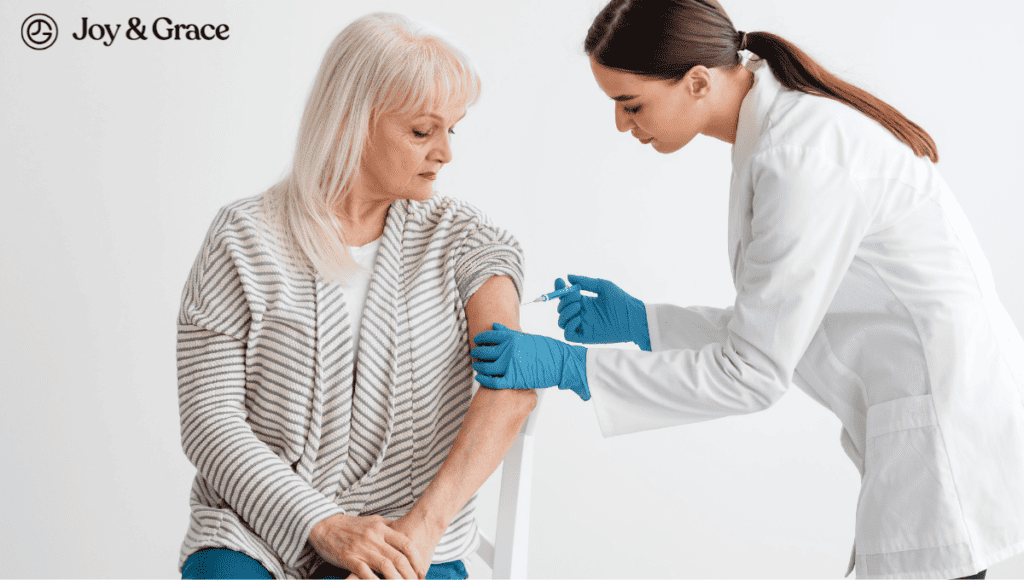
Yes, a tetanus shot can potentially cause temporary shoulder pain. The pain is typically due to the injection being administered into the arm's deltoid muscle (upper arm muscle). The muscle may react to the injection, leading to inflammation and pain.
There are different types of tetanus vaccines, some of which also help prevent other diseases. These vaccines may vary in their composition, schedule, and target populations. Without going into too much detail, here are the main types:
- DTaP (Diphtheria, Tetanus, and Pertussis)
- Tdap (Tetanus, Diphtheria, and Pertussis)
- DT (Diphtheria and Tetanus)
- Td (Tetanus and Diphtheria Booster Shot)
Is Shoulder Pain After A Tetanus Shot Normal?
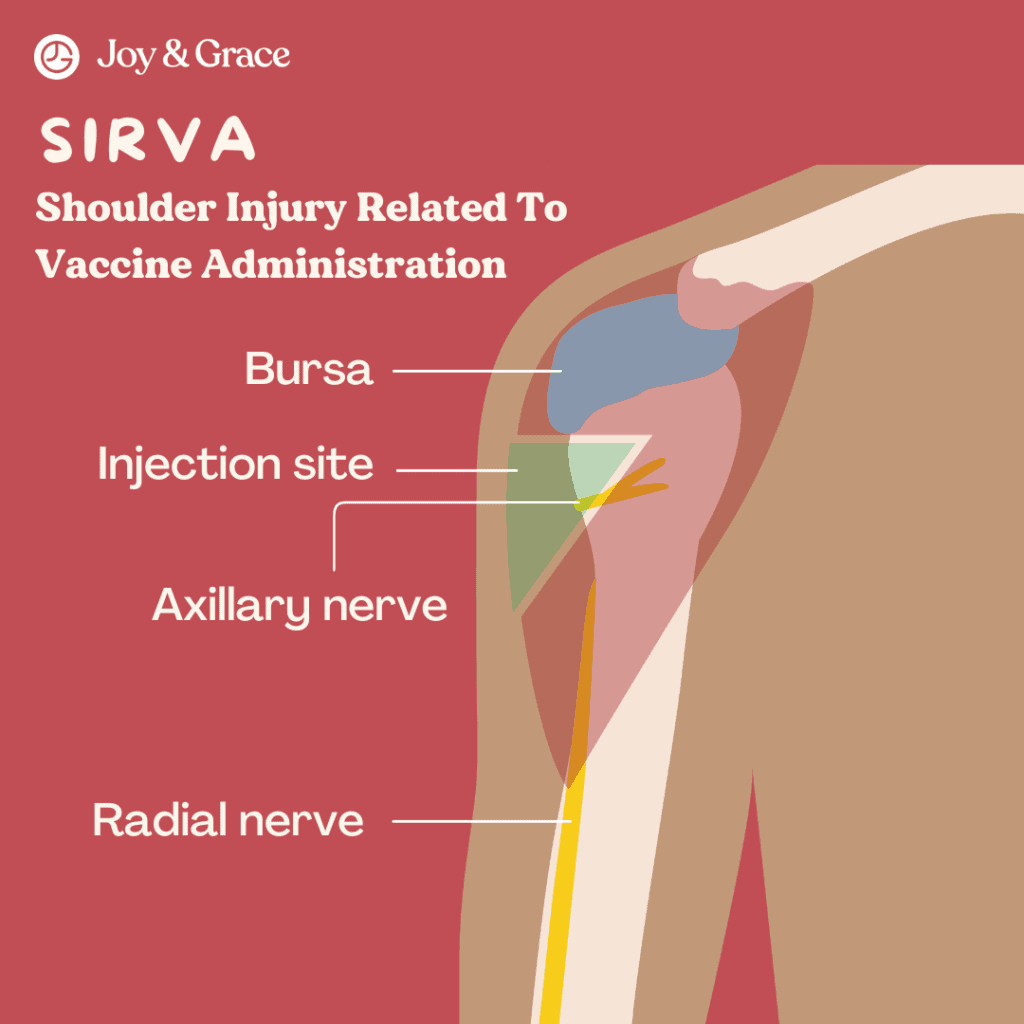
It's not uncommon to experience some pain after a tetanus shot. As mentioned above, the tetanus vaccine is administered into the deltoid muscle, the large muscle atop your upper arm.
After you get the shot, your upper arm muscle may feel sore. This is considered normal, and it doesn't necessarily mean something has gone wrong. But it can be bothersome, particularly if you're trying to sleep or carry out your daily activities.
While severe shoulder pain after a tetanus shot doesn't occur often, it’s not unheard of. In some cases, severe shoulder pain after a tetanus shot could be a sign of “shoulder injury related to vaccine administration,” or SIRVA. This is especially true if the pain does not resolve with over-the-counter painkillers.
SIRVA is a rare but recognized condition that can occur if the vaccine is injected too high in the arm, potentially causing inflammation and pain.
According to a study, this type of shoulder injury can actually occur with any vaccine injection, not just the tetanus shot.
In one case series involving 13 patients, Td shots comprised 15% of SIRVA cases, and Tdap accounted for another 15%.
What Are The Risk Factors For Getting SIRVA From Tetanus Shots?
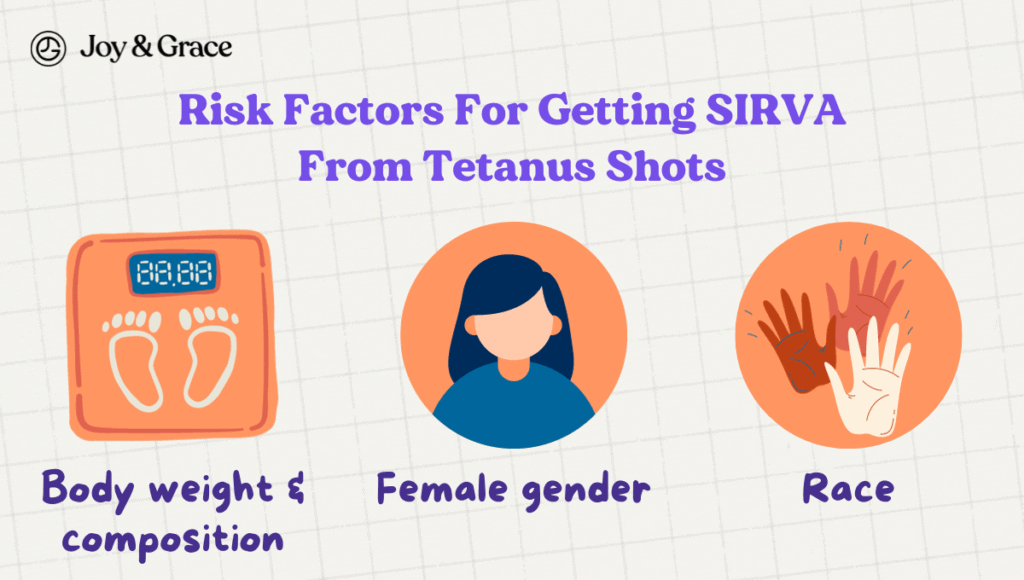
The biggest risk factor for developing SIRVA is how the vaccine is given. But this is way out of your control. However, according to a study, some factors may increase your chances of getting SIRVA. These include:
- Body weight and composition
According to the study, men and women weighing less than 60 kg are more likely to develop shoulder complications from vaccination. This risk can extend to 70 kg in women and 75 kg in men. This may be because injections are likelier to go deeper and hit other tissues in thinner individuals.
- Female gender
In the study, most patients with SIRVA were female. The researchers believe this is due to the smaller muscle mass seen in women. Women may have smaller deltoids than men, making them more prone to deeper needle insertion.
- Race
According to the study, Asian women have smaller deltoids compared to Caucasians. As mentioned above, smaller deltoid muscles may make you more susceptible to developing SIRVA.
What Are The Symptoms Of SIRVA?
Here are the typical symptoms of SIRVA:
- Sudden appearance of severe shoulder pain and tenderness
- Reduced range of shoulder motion
- Pain doesn’t resolve with common over-the-counter painkillers
- Redness and swelling
- Arm weakness
It's crucial to understand that while these symptoms could signal SIRVA, they can also indicate other shoulder issues. Therefore, it is important to have clear communication with your healthcare provider.
Can A Tetanus Shot Cause Long-Term Shoulder Damage?
Like any vaccination, a tetanus shot typically does not cause long-term shoulder damage when given correctly. However, a study shows that if the tetanus shot causes SIRVA, it could lead to a group of conditions that can damage the shoulder over time. These conditions include:
- Adhesive capsulitis, or frozen shoulder.
Adhesive capsulitis, or "frozen shoulder," is a condition that causes pain and stiffness in the shoulder, making it hard to move.
- Shoulder Bursitis
Bursitis is inflammation of the bursae. These tiny sacs filled with fluid protect bones and soft tissues from rubbing against each other. Pain, stiffness, swelling, and redness are all signs of bursitis.
- Shoulder impingement
Shoulder impingement happens when the space between your shoulder's top bone and your rotator cuff gets smaller. It can be excruciating and makes lifting your arm to shoulder height hard.
- Rotator cuff tendonitis and rotator cuff tears
The tendons forming the rotator cuff muscles may get inflamed or damaged. Tendonitis causes mild swelling, pain, and tenderness in the area.
If these conditions are left untreated, they may lead to permanent damage and chronic shoulder pain.
Can A Tetanus Shot Hit A Nerve?
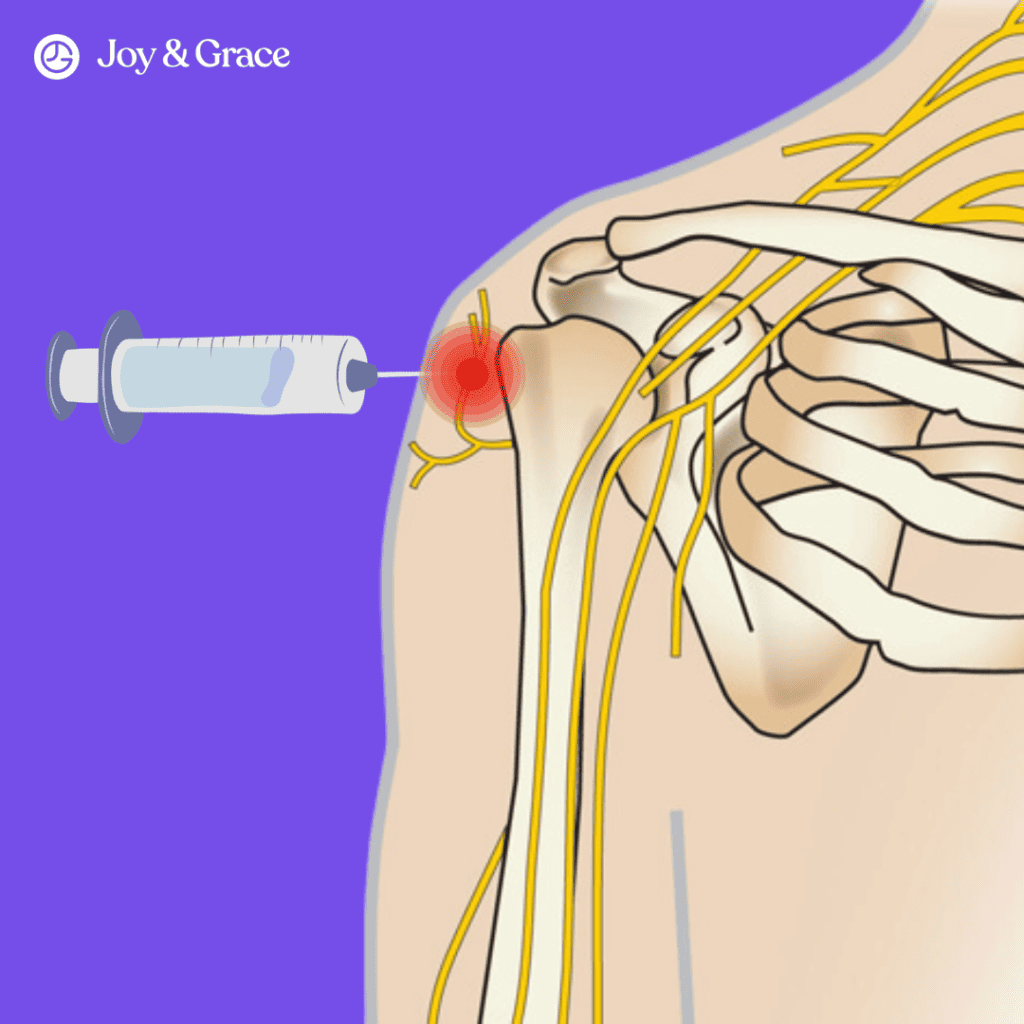
A tetanus shot can hit a nerve if it is not administered correctly. The tetanus vaccine is typically given as an intramuscular injection. This means the goal is to inject it into the muscle without hitting nearby nerves or blood vessels. But there’s always a tiny possibility that things don’t go as planned.
According to a study, the radial nerve may be injured if the vaccine is injected too low. Meanwhile, the axillary nerve may be injured if the vaccine is injected too far to the side.
If the needle hits a nerve by accident, it can hurt the nerve. Symptoms of nerve injury from an injection may include:
- Shooting pain that can radiate down the arm
- Burning or tingling sensations
- Numbness
- Weakness
If you suspect an injection has hit a nerve or have any unusual symptoms following a vaccination, seek medical attention immediately.
How Soon After A Tetanus Shot Could Shoulder Pain Start?
Shoulder pain can potentially start as soon as a few hours after receiving a tetanus shot, commonly in the form of soreness or discomfort. Meanwhile, shoulder pain from SIRVA usually starts within 48 hours after vaccination. However, the pain may start even sooner. According to a review, the majority of patients had symptoms of SIRVA within 24 hours.
In one case, a 23-year-old woman developed pain and limited range of motion in the left shoulder 24 hours after receiving a tetanus vaccine (dTpa). The patient had severe shoulder pain for 2 to 3 days.
How Long Does Shoulder Pain Last After Tetanus Shot?
Usually, shoulder pain from a tetanus shot subsides within one to two days. However, if you have SIRVA, the pain may linger a tad bit longer. In the case we mentioned above, the pain persisted for six weeks.
In another case, the patient still had severe shoulder pain eight weeks after her tetanus shot.
How Can I Ease Shoulder Pain From A Tetanus Vaccine?
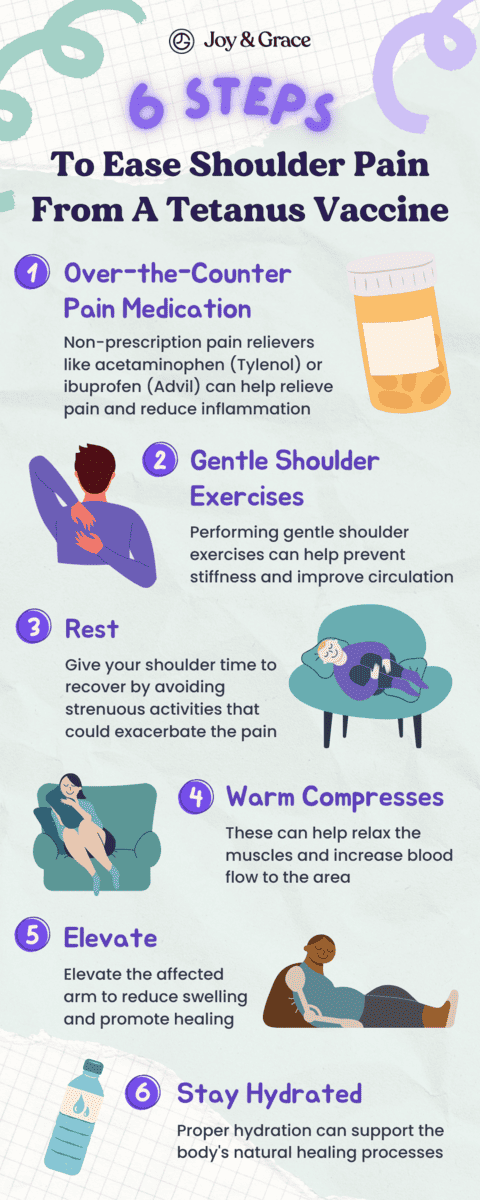
Shoulder pain following a tetanus vaccine or intramuscular injection is common and usually mild. However, if you're experiencing shoulder discomfort, there are several steps you can take to ease the pain:
- Over-the-Counter Pain Medication
Non-prescription pain relievers like acetaminophen (Tylenol) or ibuprofen (Advil) can help relieve pain and reduce inflammation. Always make sure to follow the dosing instructions on your prescription.
- Gentle Shoulder Exercises
Performing gentle shoulder exercises can help prevent stiffness and improve circulation. Avoid any strenuous or excessive movements that could worsen the pain.
- Rest
Give your shoulder time to recover by avoiding strenuous activities that could exacerbate the pain. Resting the affected arm can help speed up the healing process. Beverage suggestions include water, herbal tea, diluted fruit juices, and coconut water. Avoid alcohol and caffeinated drinks, which can contribute to dehydration.
- Warm Compresses
After a day or two of applying ice, you can switch to warm compresses. These can help relax the muscles and increase blood flow to the area.
- Elevate
If possible, elevate the affected arm to reduce swelling and promote healing.
- Stay Hydrated
Proper hydration can support the body's natural healing processes.
Remember that mild shoulder pain following a tetanus vaccine is an expected and common side effect. It usually resolves on its own within a few days to a week. And don’t forget to bring up any concerns or existing medical conditions with your doctor.
Can I Ice My Shoulder After A Tetanus Shot?
Absolutely! Icing your shoulder after a tetanus shot will help reduce any potential inflammation and shoulder muscle pain. According to a review, cooling techniques can help reduce pain from vaccination in adults.
Ice helps constrict blood vessels, decreasing swelling and easing discomfort. It's a natural and easy method to manage shoulder pain after a tetanus shot.
You can apply a store-bought cold pack to your shoulder or make one using a bag of frozen peas or ice wrapped in a light towel. Avoid applying the ice directly to your skin, as it may lead to frostbite. Apply the ice for 15 to 20 minutes every 2 to 3 hours during the first 48 hours of vaccination.
Should I Massage My Shoulder After A Tetanus Shot?
We couldn’t find studies about the effects of a massage after a tetanus shot in adults. However, we did find a study involving children and infants.
According to the study conducted in 1995, children who received a massage after a tetanus shot (DTaP) had a better immune reaction to the vaccine. This means their immune systems made more antibodies against the disease. However, this also caused more side effects, like a mild fever and pain at the injection site. These adverse effects weren't severe and didn't cause significant problems.
Although we can’t draw a conclusion from a single study, we’d suggest avoiding massaging the injection site directly. Instead, focus on the muscles surrounding the area. Remember to keep it gentle to avoid worsening the pain.
How Is SIRVA Treated?
SIRVA is initially treated with the same conservative methods we mentioned earlier. However, if those don’t relieve your shoulder pain, then your doctor may consider the following:
- Physical Therapy
A physical therapist may be recommended to help improve shoulder mobility and strength. They can provide exercises and stretches to aid in the rehabilitation process.
- Corticosteroid Injections
In some cases, you may need steroid injections to reduce inflammation and pain in the shoulder joint. (What would happen if a steroid shot hit a nerve? Answers here)
- Surgery
Surgery may be considered in severe cases of SIRVA or when other treatments are ineffective. Surgical options may include repairing damaged tissues or addressing structural issues in the shoulder joint. The specific type of surgery will depend on the nature and extent of the injury.
Please note that treatment options depend on the severity of the condition and individual health factors. Always work closely with your healthcare provider to develop a comprehensive and tailored treatment plan.
How Do I Prevent SIRVA?
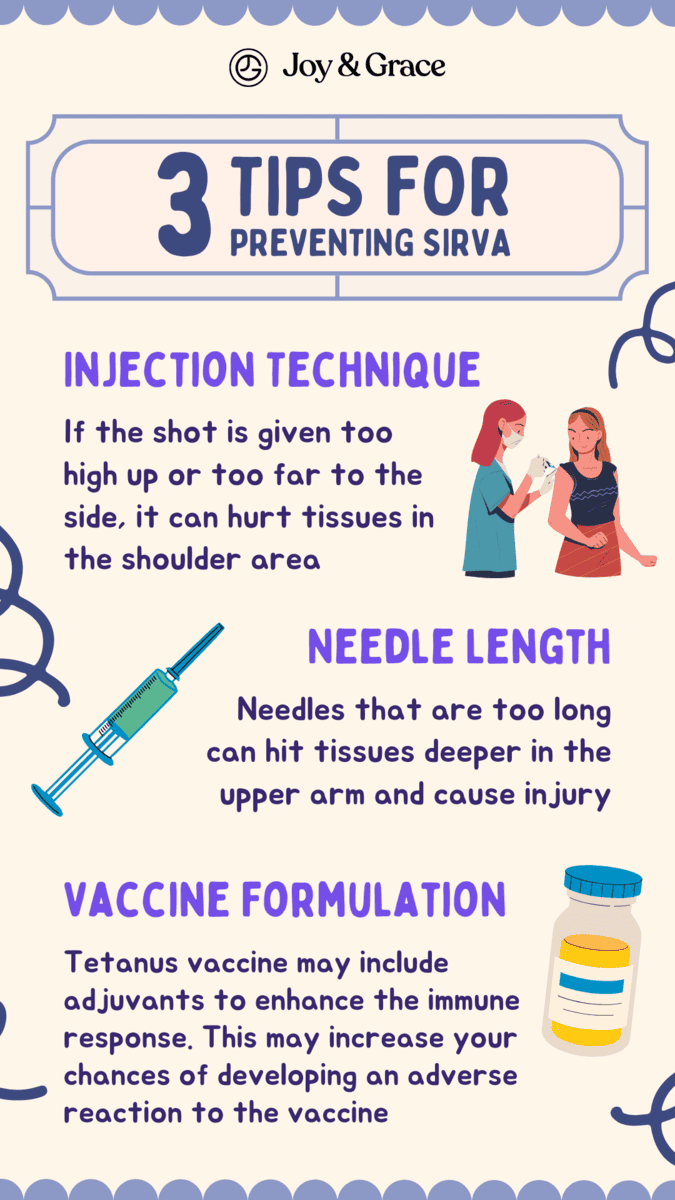
Prevention is also a crucial component of managing SIRVA. However, the prevention of SIRVA mainly falls into the hands of the medical professional giving you the tetanus shot. That said, you need to understand the factors outside your control. These include:
- Injection Technique
The most significant risk factor for SIRVA is improper injection technique. If the shot is given too high up or too far to the side, it can hurt tissues in the shoulder area.
- Needle Length
The length of the needle matters. Needles that are too long can hit tissues deeper in the upper arm and cause injury.
- Vaccine Formulation
Vaccines, including the tetanus vaccine, often include adjuvants to enhance the immune response. This may increase your chances of developing an adverse reaction to the vaccine.
When Should I See A Doctor For Shoulder Pain After A Tetanus Shot?
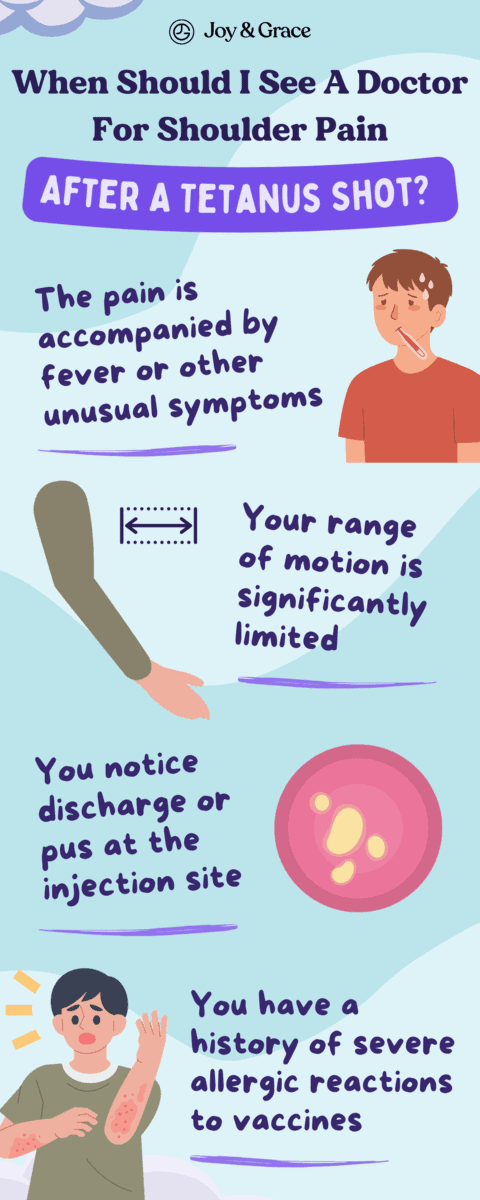
You should consider seeing a doctor for shoulder pain after a tetanus shot if:
- The pain is accompanied by fever or other unusual symptoms
If you develop severe pain along with a fever, chills, or other symptoms that are not typical after a vaccination, consult a healthcare professional.
- Your range of motion is significantly limited
If you find it difficult to move your arm or shoulder, or if there's weakness or numbness in your arm, it's essential to have it examined by a doctor.
- You notice discharge or pus at the injection site
This can be a sign of infection and should be evaluated promptly.
- You have a history of severe allergic reactions (anaphylaxis) to vaccines
If you've experienced a severe reaction to vaccines or vaccine components in the past, you need to inform your doctor before getting the shot.
Seek medical attention if you develop any symptoms of an allergic reaction after a tetanus shot. This includes:- Difficulty breathing
- Hives
- Swelling of the face, lips, tongue, or throat
Takeaway
Remember, while shoulder pain after a tetanus shot can be slightly inconvenient, the benefits of receiving the shot far outweigh the temporary discomfort. Tetanus vaccination offers protection against the potentially lethal tetanus disease.
Every jab can come with some level of discomfort. However, it usually isn’t severe. This isn’t the case for everyone, though. Some people can develop a condition called “shoulder injury related to vaccine administration,” or SIRVA.
This condition can lead to intense and persistent shoulder pain. If you do develop this condition, don’t lose hope. The treatment of SIRVA is very similar to that of everyday shoulder pain or other shoulder conditions.















